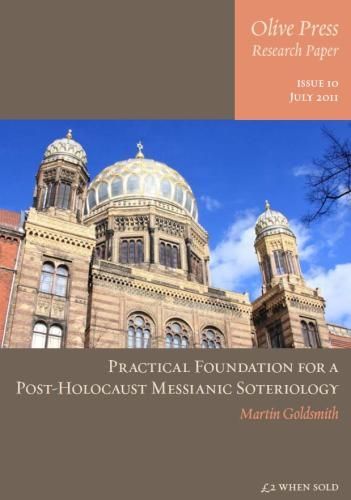In "Practical Foundation for a Post-Holocaust Messianic Soteriology," Martin Goldsmith explores the intersection of faith, salvation, and suffering in the aftermath of the Holocaust. The paper, presented at the European Messianic Theological Symposium, provides a profound theological reflection on how the Shoah, as a unique and catastrophic event, challenges traditional understandings of God’s nature, grace, and salvation. Goldsmith emphasizes that while the Holocaust casts a dark shadow over Jewish history, it also highlights God's covenantal promises, the necessity of resurrection, and the hope that new life follows suffering.
Goldsmith argues that the questions raised by the Holocaust about God’s goodness and sovereignty demand a robust, biblically grounded response. He acknowledges the theological challenge of reconciling the existence of such profound evil with belief in a sovereign, loving God. Yet, he asserts that suffering is intrinsic to the coming of God’s kingdom, drawing from the biblical narratives that suggest suffering precedes redemption. Drawing upon the story of Job, Goldsmith explores how God, while allowing suffering, also shares in it, offering a theology of a "suffering God" who is present with His people even in their darkest hours.
The paper further delves into the implications of post-Holocaust theology for soteriology—the doctrine of salvation. Goldsmith affirms that the suffering of God's people, including the Jewish people in the Holocaust, aligns with the biblical vision of redemption. He calls attention to the transformative power of the cross, resurrection, and ascension of Jesus, emphasizing that these events not only offer salvation to individuals but also hope for the restoration of the entire world. The resurrection of Jesus, for Goldsmith, is central to the post-Holocaust soteriology, offering a vision of new life, even in the aftermath of tragedy.
In addition to exploring the theological dimensions of salvation, Goldsmith presents the Trinity as the ultimate model of relational love and mutual servanthood. He notes that this divine unity is foundational to understanding human relationships, including the way the church should relate to the wider world in the aftermath of suffering and injustice.
Goldsmith also tackles the challenge of continuity in salvation history, particularly regarding the relationship between Israel, the Church, and the broader world. He asserts that Jesus is not only the fulfillment of Jewish history but also the Messiah for all people. The resurrection and ascension of Jesus are presented as both a personal hope for believers and a cosmic promise of restoration, offering a theological foundation for living in a post-Holocaust world.
This compelling and thought-provoking paper is a must-read for those interested in Messianic soteriology and the theological implications of the Holocaust. As CMJ-USA continues its mission to engage the Jewish community with the good news of Jesus, Goldsmith’s work provides a powerful and redemptive vision of salvation that speaks to the enduring hope of both the Jewish people and the world. Download the e-book today to explore how the themes of suffering, resurrection, and the promise of God’s kingdom continue to shape the Messianic faith.

